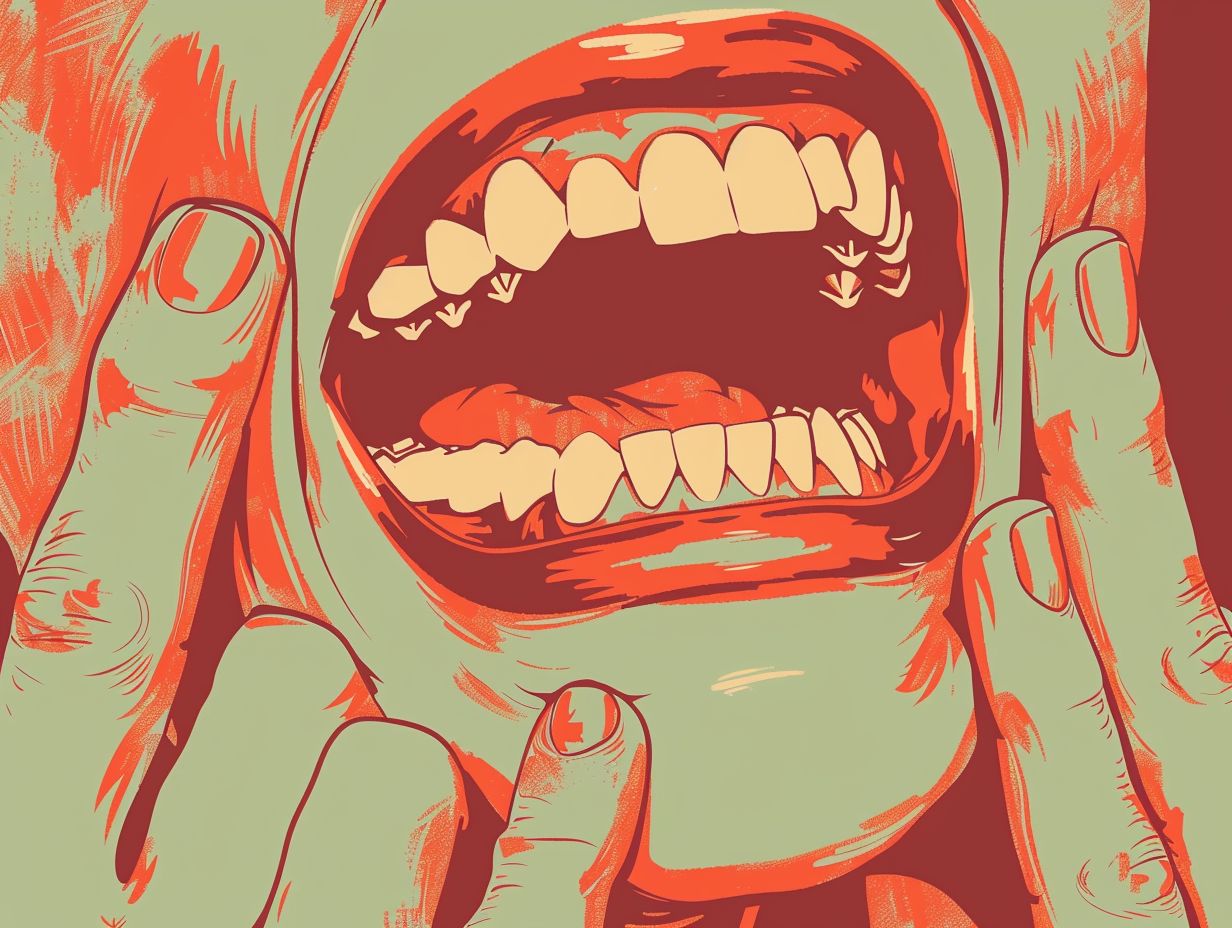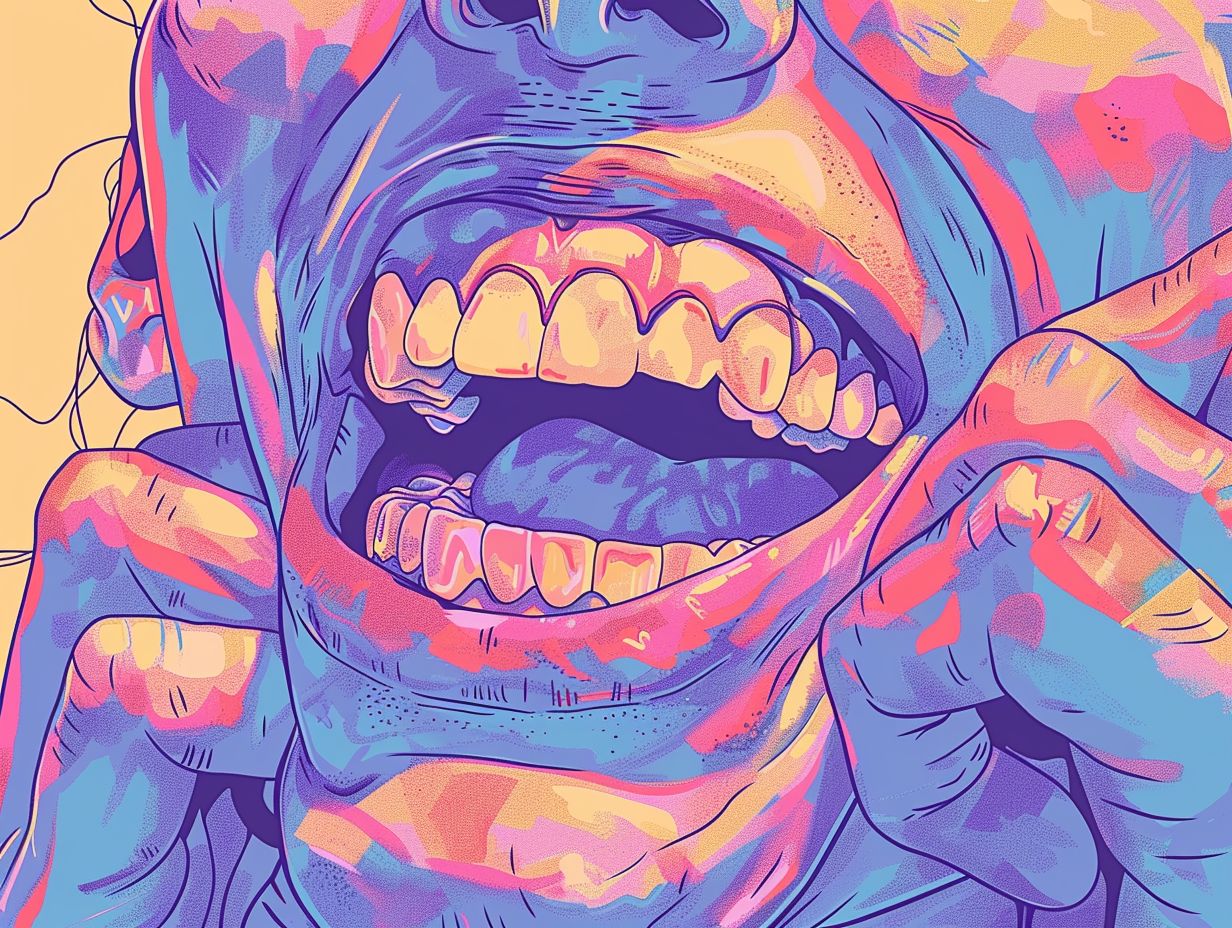Do you ever wake up with a sore jaw or headache? You might actually be grinding your teeth, a condition known as bruxism.
Let’s get into the symptoms, causes, and consequences of teeth grinding, as well as who is at risk for this common issue. We’ll also chat about how teeth grinding is diagnosed and share some home remedies to help ease the discomfort.
Curious to learn more about this condition and when it’s time to seek professional help?
What is Teeth Grinding?

When you grind your teeth, also known as bruxism, it’s like your pearly whites are having a secret nighttime rave without your permission. This sneaky habit usually happens while you’re catching some Z’s, and it can lead to issues like jaw pain, worn enamel, or even some serious teeth damage. Bruxism can sneak up on you for a variety of reasons, whether it’s stress, wonky teeth alignment, or just an abnormal bite.
Did you know that a good chunk of the population deals with teeth grinding at some point? While the occasional grind might not be a big deal, if you find yourself clenching and grinding on the regular, it could spell trouble for your oral health and overall quality of life.
What Are the Symptoms of Teeth Grinding?
If you grind your teeth, you might be familiar with some common symptoms like jaw pain, dental problems, and muscle tightness in your face and neck.
People who grind their teeth may also suffer from headaches, earaches, and teeth that are worn down. In more serious situations, teeth grinding can cause damage to tooth enamel, cracked teeth, and even tooth loss. You might notice that your teeth feel more sensitive or have trouble opening and closing your mouth. The muscle tension in your jaw and face can be uncomfortable and make it hard to chew or talk properly. It’s important not to ignore these signs as they could lead to more dental issues and ongoing pain.
What Are the Causes of Teeth Grinding?
Teeth grinding can be caused by stress, muscle tension, misaligned teeth, or sleep disorders.
Stress is a common trigger for teeth grinding as you might clench your jaws when feeling anxious or overwhelmed. If you have muscle tension in your jaw and face, this could make things worse, leading to grinding during sleep or even when you’re awake. Misaligned teeth may give you an uneven bite, causing your body to try to fix it by grinding your teeth. Sleep problems like sleep apnea can also play a role in teeth grinding as your body tries to find a comfortable position. Knowing about these factors can help you find ways to manage stress, deal with muscle tension, and ease those teeth grinding issues.
Who is at Risk for Teeth Grinding?
If you’re experiencing high stress levels, dealing with anxiety, or finding yourself clenching your teeth, you might be at a higher risk for grinding your teeth.
These factors are crucial because they can lead to increased tension in your jaw muscles, which might make you grind your teeth involuntarily while you sleep. To lower the chances of teeth grinding, consider making some lifestyle changes like adding stress-relieving activities such as yoga or meditation into your routine. Taking a holistic approach by tackling the root of your stress and anxiety can also help you manage teeth clenching habits.
It’s really important for people in these situations to pay attention to their oral health and reach out to a professional if teeth grinding keeps happening.
How to Diagnose Teeth Grinding?
When diagnosing teeth grinding, a dentist will give you a thorough examination to check for tooth wear, jaw tenderness, and any alignment issues, while also exploring holistic healing options.
During your dental assessment, the dentist may ask about your lifestyle habits, stress levels, and sleep patterns to pinpoint what might be causing your teeth grinding.
Symptoms like headaches, facial pain, or trouble sleeping are crucial in evaluating your condition.
Holistic healing for teeth grinding focuses on getting to the root of the issue through relaxation techniques, dietary changes, and stress management.
By combining holistic approaches with traditional dental care, you can create a well-rounded treatment plan that tackles teeth grinding from all angles.
What Are the Consequences of Teeth Grinding?
When you grind your teeth, it can cause a whole host of problems like dental issues, muscle tension, and poor sleep quality.
All that grinding and clenching can wear down your enamel, crack your teeth, and throw your jaw out of alignment. Not only can you end up with dental woes, but the constant muscle tension from teeth grinding can also trigger headaches, neck pain, and issues with your temporomandibular joint (TMJ). The strain on your jaw muscles and joints can mess with your sleep, making you wake up frequently throughout the night and leaving you feeling tired and cranky during the day.
What Are the Effects on Teeth?

When you grind your teeth, you’re putting your pearly whites at risk for issues like enamel wear, fractures, and tooth sensitivity. That constant clenching and grinding can wear down the enamel, making your teeth more prone to cavities and decay. The pressure from grinding can even cause tiny fractures in your teeth, leading to pain and compromising your overall oral health. And let’s not forget about tooth sensitivity – it’s no fun feeling discomfort when you eat or drink hot or cold stuff.
To tackle these concerns from a whole-body perspective, try incorporating stress-reduction techniques, jaw exercises, and wearing a custom mouthguard at night. These practices can help ease your symptoms and shield your teeth from further damage.
What Are the Effects on Jaw Muscles?
When you grind your teeth, it puts a lot of strain on those jaw muscles, leading to discomfort and stiffness. But don’t worry, you can ease that tension by doing some jaw exercises and muscle relaxation techniques.
This bad habit can really tire out those jaw muscles, causing tension that spreads to your neck and head. Try out some easy exercises like gentle jaw stretches or get into some mindfulness techniques to loosen up those facial muscles and get rid of that tension. To tackle the built-up strain, you can also apply heat or ice packs to your jaw area and use relaxation methods like deep breathing or progressive muscle relaxation. These tricks will help you get rid of that discomfort and keep your muscles nice and chill.
What Are the Effects on Sleep?
When you grind your teeth, it can really mess with your sleep, affecting how well-rested you feel and leaving you tired during the day. All that tossing and turning from teeth grinding interrupts your sleep cycle, making it hard to get that deep, restful sleep your body needs. No wonder you feel exhausted and cranky!
To tackle this issue, try setting up a soothing bedtime routine. Simple habits like cutting back on screen time before bed, creating a peaceful sleep environment, and trying relaxation techniques like deep breathing or meditation can work wonders in improving your sleep quality and minimizing teeth grinding.
Home Remedies for Teeth Grinding
When dealing with teeth grinding, remember to try some home remedies to help ease the issue. You can manage stress through practices like meditation, deep breathing exercises, and yoga – these can help release tension that leads to grinding.
Another useful tip is to apply warm compresses to your jaw muscles to ease stiffness and find relief. Also, consider incorporating relaxation exercises like progressive muscle relaxation or gentle jaw massages to bring a sense of calm and reduce the urge to clench or grind your teeth.
1. Stress Management Techniques
To effectively manage teeth grinding, you should try out some stress-busting techniques. Mindfulness practices, relaxation exercises, and cognitive behavioral therapy are key to easing anxiety and promoting relaxation in your life.
Incorporate mindfulness practices like meditation and deep breathing exercises into your daily routine. These can really help lower the tension that’s causing you to grind your teeth. Relaxation techniques such as progressive muscle relaxation or yoga are great for calming your body and mind, reducing the triggers for teeth grinding. And don’t forget about cognitive behavioral therapy! It can help you identify and change those negative thought patterns that are adding to your stress and anxiety, leading to a more balanced mental state and less teeth grinding.
2. Warm Compress
When you’re dealing with jaw discomfort from teeth grinding, try applying a warm compress to the area. This simple trick can work wonders in relaxing your muscles, easing tension, and reducing the pain associated with grinding your teeth.
The heat from the compress works like magic, boosting blood flow to your muscles and helping them relax. This can be a game-changer for those stiff muscles that tend to make teeth grinding even worse. By giving your jaw muscles some heat therapy with a warm compress, you’re basically giving them a little spa day. It soothes the area, making it less likely for you to clench and grind your teeth. Not only does this method bring you instant relief from pain and tension, but it’s also a cozy and natural way to keep your jaw discomfort in check, all while helping your facial muscles chill out.
3. Avoiding Caffeine and Alcohol

If you’re dealing with teeth grinding, making some dietary adjustments like cutting back on caffeine and alcohol can really make a difference. These changes can help keep you hydrated and set you up for healthy habits that benefit your overall well-being.
You see, caffeine and alcohol have a way of revving up your nervous system, which can amp up jaw clenching while you sleep. By giving these substances a break, you might notice a decrease in nighttime grinding. And don’t forget to keep yourself well-hydrated – dehydration can cause muscle tension that worsens the issue. Building in some good habits like regular exercise and stress management techniques can also go a long way in supporting your jaw muscles and easing that teeth grinding.
4. Muscle Relaxation Exercises
Engaging in jaw exercises and muscle relaxation techniques can help you relieve tension, promote relaxation, and reduce the frequency of teeth grinding episodes. Try incorporating simple jaw movements like gently opening and closing your mouth or doing side-to-side movements. These actions can release tension in your jaw muscles and improve circulation.
Practice deep breathing exercises while focusing on relaxing your facial muscles to further reduce stress and tension in your jaw area. These techniques not only offer immediate relief but also contribute to long-term muscle relaxation, leading to fewer occurrences of teeth grinding. So, give these methods a try and see how they can help you relax your jaw muscles and decrease teeth grinding.
5. Mouth Guard
Using a custom-fit mouth guard can protect your teeth from grinding and minimize the impact of bruxism on your dental health, aligning perfectly with a holistic approach to your oral care needs.
These mouth guards act as a shield between your upper and lower teeth, stopping them from grinding against each other while you sleep or face stressful situations. By easing the pressure and friction on your teeth, they help preserve your enamel and prevent damage to your tooth structure.
Incorporating a mouth guard into your dental care routine can also enhance your sleep quality by reducing the discomfort caused by teeth grinding. When you take a holistic approach to dental care, you’re recognizing how your oral health is linked to your overall well-being. That’s why mouth guards are a fantastic tool for keeping your smile healthy and bright.
6. Essential Oils
You can use essential oils like chamomile and lavender as herbal remedies to help you relax and reduce stress, offering natural solutions for dealing with teeth grinding.
Chamomile, with its soothing properties, can calm your nervous system and bring a sense of peace, which can be really helpful if you grind your teeth. Similarly, lavender essential oil is great for easing anxiety and promoting deep relaxation, which can help with the muscle tension often linked to teeth clenching. By adding these essential oils to your daily routine, you can tap into their natural benefits to boost your overall well-being and lessen the impact of teeth grinding on your oral health.
7. Calcium and Magnesium Supplements
If you’re dealing with teeth grinding, consider adding calcium and magnesium supplements to your routine. They can help address any potential deficiencies, support muscle relaxation, and fit right in with a holistic approach to managing this issue.
These essential minerals are like the dynamic duo for your nerves and muscles, playing a vital role in preventing and easing teeth grinding. Calcium does double duty by fortifying your teeth and jawbone, while magnesium swoops in to combat muscle tension and spasms that might be causing your grinding habit.
For an extra boost, herbal supplements like valerian root or passionflower can team up with calcium and magnesium to promote relaxation and lower stress levels. It’s all about taking a natural, holistic approach to managing teeth grinding and giving your oral health some much-needed TLC.
When to Seek Professional Help?
If home remedies aren’t cutting it for your teeth grinding, it’s time to chat with a healthcare professional. They can help you figure out what’s up and set you on the right path to relief. But hey, don’t just sit back and wait – there are things you can do to help yourself out too.
In terms of teeth grinding (or bruxism, if you want to get fancy), it’s no joke. Left unchecked, it can really mess up your dental health. Getting professional advice isn’t just about diagnosis – it’s about getting a solid game plan to tackle this head-on.
Besides the pro advice, there are some self-care moves you can make. Try out stress-busting techniques, pop in a mouthguard before bed, and maybe ease off on the caffeine. These self-care habits can make a real difference, helping you manage those teeth grinding moments better. It’s all about looking after your oral health and keeping yourself feeling great.
Frequently Asked Questions

What are some home remedies for teeth grinding?
Some potential home remedies for teeth grinding include practicing relaxation techniques, using a mouth guard, avoiding caffeine and alcohol, and massaging the jaw muscles.
How can relaxation techniques help with teeth grinding?
Relaxation techniques, such as yoga and meditation, can help reduce stress and tension in the body, which can contribute to teeth grinding. By practicing these techniques regularly, you may be able to reduce the frequency and severity of teeth grinding.
Do mouth guards really work for preventing teeth grinding?
Yes, mouth guards can be an effective way to prevent teeth grinding. They help by creating a barrier between your upper and lower teeth, which can prevent further damage to your teeth and jaw muscles.
Why should I avoid caffeine and alcohol if I grind my teeth?
Caffeine and alcohol are known to increase tension and stress in the body, which can make teeth grinding worse. By avoiding these substances, you may be able to reduce the intensity of your teeth grinding and improve your overall oral health.
Can massaging my jaw muscles help with teeth grinding?
Yes, massaging your jaw muscles can help relieve tension and stress in the muscles, which can contribute to teeth grinding. You can try using your fingers or a warm compress to gently massage the muscles in your jaw and temples.
Are there any natural remedies for teeth grinding?
Yes, there are some natural remedies for teeth grinding that you can try. These include drinking chamomile tea or using essential oils, such as lavender or peppermint, which can help promote relaxation and reduce tension in the body.

